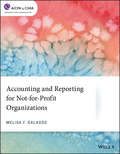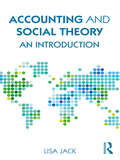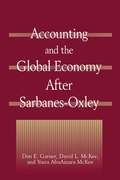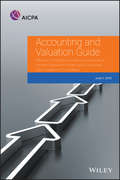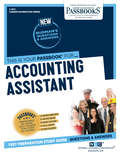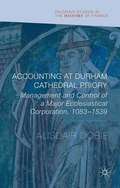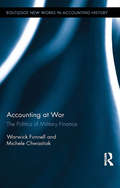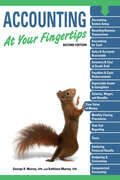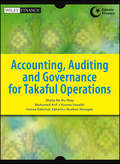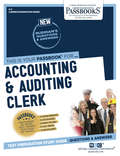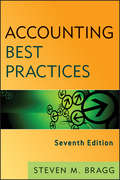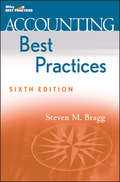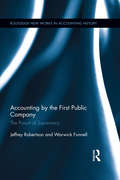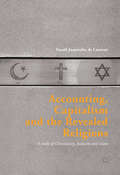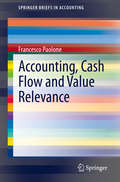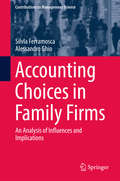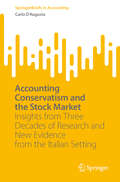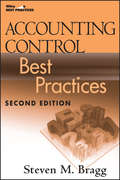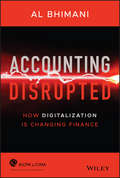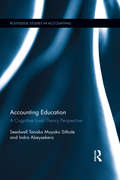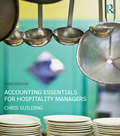- Table View
- List View
Accounting and Reporting for Not-for-Profit Organizations (AICPA)
by Melisa F. GalassoThis title provides the tools necessary to go beyond the theory and create value-added services for accountants&’ clients. In the not-for-profit arena. This book allows readers to examine, evaluate, and perform case studies, which will enhance their working knowledge of fundamental not-for-profit accounting and reporting, presentation requirements, note disclosures unique to not-for-profits, and options allowed under generally accepted accounting principles. Key topics include: Financial statement presentation, including FASB's financial reporting standard Statement of activities Statement of financial position and statement of cash flow Note disclosures Contribution concepts Functional expense and allocation of costs Endowments Operating versus non-operating Split interest agreements and beneficial trusts Agency transactions Programmatic investments Common financial statement mistakes
Accounting and Social Theory: An introduction
by Lisa JackIs society possible without accounting? In speech or in writing, we communicate actions, plans and decisions using numbers, calculations, words and images. Although accounting research is dominated by quantitative analyses, the role of accounting in society is firmly established over thousands of years. In this concise book, Lisa Jack demonstrates the power of social theory in expanding the value of accounting research. Accounting and Social Theory: An introduction includes advice on research problems as well as guidance on fertile areas for new research. The tools, techniques and developments covered by the author help readers to see social research in accounting as the study of the use, misuse and abuse of accounting communications by people and the effects that this has on social relationships. Stories of accounting in war, agriculture and food, gender, health and other areas illustrate the ways in which the threads of accounting run through society. Having emerged from the author’s wealth of teaching experience, this book provides a student-focused treasure trove that illuminates the field for early-career researchers in accounting and established academics looking to expand the impact of their work.
Accounting and the Global Economy After Sarbanes-Oxley
by Don E. Garner David L McKee Yosra AbuAmara McKeeThis book is essential for students and practitioners in accounting, international business, finance, and economics. In a straightforward and readable style, it focuses on the changing accounting and auditing standards in national and global economies in the post-Enron/Arthur Andersen era. The authors clarify the reasons behind and consequences of the accounting profession's failure in auditing and self-regulation, as most firms placed consulting profits ahead of public audit duties. They show how Sarbanes-Oxley solutions, while not perfect, are major contributors to the profession's redemption, and have enabled it to rise to new heights of service and revenue. The book offers a detailed examination of accounting practitioners' past challenges and future prospects. It provides a realistic analysis of specific issues facing accounting and auditing firms today, including the growing problem of independence; the need for one set of international accounting standards and one set of auditing standards; adjustments facing the global financial system; and the impact of the Internet and communication systems on accounting firms.
Accounting and Valuation Guide: Valuation of Portfolio Company Investments of Venture Capital and Private Equity Funds and Other Investment Companies (AICPA Accounting and Valuation Guide)
by AicpaDeveloped for preparers of financial statements, independent auditors, and valuation specialists, this guide provides nonauthoritative guidance and illustrations regarding the accounting for and valuation of portfolio company investments held by investment companies within the scope of FASB ASC 946, Financial Services —Investment Companies, (including private equity funds, venture capital funds, hedge funds, and business development companies). It features16 case studies that can be used to reason through real situations faced by investment fund managers, valuation specialists and auditors, this guide addresses many accounting and valuation issues that have emerged over time to assist investment companies in addressing the challenges in estimating fair value of these investments, such as: Unit of account Transaction costs Calibration The impact of control and marketability Backtesting
Accounting Assistant: Passbooks Study Guide (Career Examination Series)
by National Learning CorporationThe Accounting Assistant Passbook® prepares you for your test by allowing you to take practice exams in the subjects you need to study. It provides hundreds of questions and answers in the areas that will likely be covered on your upcoming exam, including but not limited to: fundamantals of account keeping and bookkeeping; clerical operations with letters and numbers; arithmetic computation and reasoning; understanding and interpreting tabular material; understanding and interpreting written material; and more.
Accounting at Durham Cathedral Priory: Management And Control Of A Major Ecclesiastical Corporation 1083-1540 (Palgrave Studies in the History of Finance)
by Alisdair DobieThis study utilizes the rich archives which survive at Durham Cathedral to examine the way in which accounting methods and systems were adopted and adapted to manage income and expenses, assets and liabilities in changing economic environments.
Accounting at MacCloud Winery
by Robert S. Kaplan David F. Hawkins Gregory S. MillerUses a fictional new winery to introduce accounting concepts and practices such as assets, liabilities, expenses, the matching principle, and contingent activities. Designed to approach the subject at a conceptual level, allowing class discussion to focus on the underlying thought process regarding accounting, rather than on "proper" numerical calculations.
Accounting at War: The Politics of Military Finance (Routledge New Works in Accounting History)
by Warwick Funnell Michele ChwastiakAccounting is frequently portrayed as a value free mechanism for allocating resources and ensuring they are employed in the most efficient manner. Contrary to this popular opinion, the research presented in Accounting at War demonstrates that accounting for military forces is primarily a political practice. Throughout history, military force has been so pervasive that no community of any degree of complexity has succeeded in. Through to the present day, for all nation states, accounting for the military and its operations has primarily served broader political purposes. From the Crimean War to the War on Terror, accounting has been used to assert civilian control over the military, instill rational business practices on war, and create the visibilities and invisibilities necessary to legitimize the use of force. Accounting at War emphasizes the significant power that financial and accounting controls gave to political elites and the impact of these controls on military performance. Accounting at War examines the effects of these controls in wars such as the Crimean, South African and Vietnam wars. Accounting at War also emphasizes how accounting has provided the means to rationalize and normalize violence, which has often contributed to the acceleration and expansion of war. Aimed at researchers and academics in the fields of accounting, accounting history, political management and sociology, Accounting at War represents a unique and critical perspective to this cutting-edge research field.
Accounting At Your Fingertips, 2e (At Your Fingertips)
by George R. MurrayMost small business owners learn early on that it's much cheaper to do their own books (alone or with the assistance of a bookkeeper or accounting clerk) and have them reviewed by an accountant than to have a CPA on staff. With a steady supply of entrepreneurs opening new businesses, there's a real need for a one-stop accounting reference busy owners, bookkeepers, and accounting clerks can use to access the specific information they need quickly and accurately. Accounting at Your Fingertips, Second Edition, helps readers pinpoint the precise information they need on any accounting topic without wasting time. Divided into concise but complete bites that are easy to find and easy to understand, Accounting at Your Fingertips, Second Edition, covers all topics related to the monthly accounting process. Based on the notion that time is the scarcest commodity of all, this book is organized to allow readers the shortest path to the information they need, including: Organization and proper accounting procedures. Creating a chart of accounts and balance sheet accounts. Posting accounts to the general ledger. Reporting assets and expenses. Handling receivables, payroll, and cost of goods and services. Posting salaries, wages, and payroll taxes. End-of-month accounting tasks and procedures. Producing balance sheets, profit and loss statements, and end-of-year payroll reports. Closing the books at the end of the year.
Accounting, Auditing and Governance for Takaful Operations
by Sheila Nu Htay Younes Soualhi Mohamed Arif Hanna Rabittah Zaharin Ibrahim ShaugeeA comprehensive guide to current issues and practices in governance for Takaful and re-Takaful operationsAs the global demand for Islamic insurance products increases, a thorough understanding of Takaful principles is vital for accountants, auditors, and leaders of companies offering these products. This book covers the basic accounting principles and practices of Takaful operations, including the segregation of assets, liabilities, income, and expenditures between the Takaful operator and participants; the setting aside of cash reserves for meeting outstanding claims and future claims; and the management of revenue and expenditure. Featuring extensive case studies from real-world situations, this book is the perfect primer for accounting students and practitioners unfamiliar with Islamic finance and Takaful operations.Written by experts from the International Islamic University Malaysia, the leading organisation in research in Islamic financeCovers all the major accounting principles and practicesBased on real-world experience and packed with illustrative case studiesFor practicing accountants and business leaders, this book offers a thorough education in Takaful operations while also serving as an excellent guide for undergraduate students and researchers.
Accounting & Auditing Clerk: Passbooks Study Guide (Career Examination Series #C-2009)
by National Learning CorporationThe Accounting & Auditing Clerk Passbook® prepares you for your test by allowing you to take practice exams in the subjects you need to study. It provides hundreds of questions and answers in the areas that will likely be covered on your upcoming exam, including but not limited to: clerical operations; arithmetic computations; arithmetic reasoning; and more.
Accounting Best Practices
by Steven M. BraggPraise for Accounting Best Practices Sixth Edition"For a comprehensive, yet easy-to-read guide to fixing those all-too-common shortcomings in your accounting department, look no further than this excellent book. Steve Bragg provides hundreds of fixes, many of them requiring surprisingly little time or cost while providing a handy guide to common implementation pitfalls . . . I would recommend this invaluable book to anyone who is looking to enhance their existing processes, whether due to growth in their business, compliance with Sarbanes-Oxley, or just as part of their ongoing improvement process."--Martyn Webster, CPA, Director of FinanceXenoPort, Inc."This book is critical to running an efficient and accurate accounting department. The use of RFID technology to track documents is one of many valuable tools in this latest edition. A required read for the demanding accounting manager's role."--Jason Charet, CPA"I've used Steve Bragg's Accounting Best Practices books for years as a source of ideas for improvement. Like the previous editions, the Fifth Edition has a number of new, actionable best practices as well as refinements of those ideas reported in previous editions. The books are broad enough in their perspective so that nearly any organization could find ideas that could pay back the cost of the book many times over."--John Temmerman, Controller, Evangelical Lutheran Church in America"What a great resource! I have been in the accounting field for over twenty years, and I was still able to gain insight into improving processes within my office. Thanks for putting it all in one book!"--Tina M. Thomas, CPA, CTP, Controller, Goodman & Company, LLP
Accounting Best Practices (Wiley Best Practices Ser.)
by Steven M. BraggPraise for Accounting Best Practices Sixth Edition "For a comprehensive, yet easy-to-read guide to fixing those all-too-common shortcomings in your accounting department, look no further than this excellent book. Steve Bragg provides hundreds of fixes, many of them requiring surprisingly little time or cost while providing a handy guide to common implementation pitfalls . . . I would recommend this invaluable book to anyone who is looking to enhance their existing processes, whether due to growth in their business, compliance with Sarbanes-Oxley, or just as part of their ongoing improvement process." —Martyn Webster, CPA, Director of FinanceXenoPort, Inc. "This book is critical to running an efficient and accurate accounting department. The use of RFID technology to track documents is one of many valuable tools in this latest edition. A required read for the demanding accounting manager's role." —Jason Charet, CPA "I've used Steve Bragg's Accounting Best Practices books for years as a source of ideas for improvement. Like the previous editions, the Fifth Edition has a number of new, actionable best practices as well as refinements of those ideas reported in previous editions. The books are broad enough in their perspective so that nearly any organization could find ideas that could pay back the cost of the book many times over." —John Temmerman, Controller, Evangelical Lutheran Church in America "What a great resource! I have been in the accounting field for over twenty years, and I was still able to gain insight into improving processes within my office. Thanks for putting it all in one book!" —Tina M. Thomas, CPA, CTP, Controller, Goodman & Company, LLP
Accounting by the First Public Company: The Pursuit of Supremacy (Routledge New Works in Accounting History #13)
by Jeffrey Robertson Warwick FunnellThe United Dutch East India Company was the first public company, preceding the formation of the English East-India Company by over 40 years. Its fame as the first public company which heralded the transition from feudalism to modern capitalism and its remarkable financial success for nearly two centuries ensure its importance in the history of capitalism. Although a publicly owned, highly complex and diversified business, and commonly agreed to be the largest and most profitable business in the 17th century, throughout its existence the Dutch East-India Company never produced public accounts of its financial affairs which would have allowed investors to judge the performance of the Company. Its financial accounting, which changed little during its lifetime, was not designed as an aid to rational investment decision-making by communicating the Company’s financial performance but to be a means of promoting sound stewardship by senior management. This study examines the contributions of accounting to the remarkable success of the Dutch East-India Company and the influences on these accounting practices. From the time that the German economic historian Werner Sombart proposed that accounting techniques, most especially double-entry bookkeeping, were critical to the development of modern capitalism and the public company, historians and accounting scholars have debated the extent and importance of these contributions. The Dutch East-India Company was a capitalistic enterprise that had a public, permanent capital and its principal objective was to continually increase profit by reinvesting its returns in the business. Rather than the organisation and management of the Dutch East-India Company reflecting the perceived benefits of a particular bookkeeping method, the supremacy that it achieved and maintained in a very hazardous business at a time of recurring conflict between European states was a consequence of the practicalities of 17th century business and The Netherlands’ unique, threatening natural environment which shaped its social and political institutions.
Accounting, Capitalism and the Revealed Religions: A Study of Christianity, Judaism and Islam
by Vassili Joannidès de LautourThis book analyses the bearing of global monotheistic faiths towards the philosophy and practice of record keeping and accounting throughout history. The author offers a comprehensive discussion of the literal and figurative processes of taking account and ascribing accountability that link religions such as Christianity, Judaism and Islam. Chapters address theology and accounting in tandem with social behaviours to demonstrate how auditing and calculating customs permeate practising religions. This book first highlights how the four monotheisms have viewed and incorporated accounting historically, and then looks forward to the accounting debates, technologies and traditions in today’s world that derive from these religious customs. Drawing heavily on the writings of Max Weber and Werner Sombart, the author demonstrates that accounting and capitalism have religious roots far beyond the Protestant ethic.
Accounting, Cash Flow and Value Relevance (SpringerBriefs in Accounting)
by Francesco PaoloneAlthough the concept “Cash is King” is today widely recognized, the cash flow statement was rather neglected until the EU accounting regulators discovered its relevance in explaining the real value of the business. This book investigates the value relevance of the operating cash flow as reported under the International Financial Reporting Standards (IAS/IFRS) for the largest European listed companies and US listed companies in the past recent years. Using the model based on the valuation theory developed by Ohlson, which measures the market value of equity as a function of accounting variables, the author concludes that operating cash flow represents a significant variable in determining the value relevance of the largest European and US listed companies. These findings provide siginificant implications for standard setters and support the continued requirements for disclosure of cash flow information under IAS 7.
Accounting Challenges for Semi-Autonomous Revenue Agencies in Developing Countries
by Seth E. TerkperFinancial report from the IMF
Accounting Choices in Family Firms: An Analysis Of Influences And Implications (Contributions To Management Science Series)
by Silvia Ferramosca Alessandro GhioThis book provides a critical analysis of the current state of knowledge on the relationship between family firms and a wide range of accounting choices, including earnings management, accounting conservatism, and financial and non-financial disclosure. <P><P>In examining the choices made in family firms, the authors explore and elucidate the relevance of agency, socioemotional wealth, stewardship, and resource-based theories. Readers will also find close consideration of the impacts of a country’s culture and societal values on accounting choices. In particular, further evidence is provided on the impact of different cultures on accounting conservatism in family businesses. <P><P>Finally, avenues for future accounting research on family firms are discussed, highlighting theoretical and empirical challenges. In addition to offering a revealing analysis of the influence of ownership types and cultures on accounting choices within family firms, the book identifies significant practical implications for the management of family firms and policy implications for regulators and standard setters.
Accounting Conservatism and the Stock Market: Insights from Three Decades of Research and New Evidence from the Italian Setting (SpringerBriefs in Accounting)
by Carlo D'AugustaThis book comprehensively examines accounting conservatism and its relationship with the stock market. Through a historical overview and a review of recent literature, it explores the evolution of conservatism research and the conceptual developments, measurement advancements, and empirical findings produced by academic scholars over the last decades. Additionally, it critically evaluates the applicability of conservatism models developed in the U.S. market to the Italian setting, offering a thorough analysis of their validity. Furthermore, the book presents novel empirical findings on conservatism's impact on the Italian stock market during the Covid-19 pandemic. This nuanced exploration offers valuable insights for academics, practitioners, and researchers seeking to understand the complexities of financial reporting practices in diverse market environments.
Accounting Control Best Practices
by Steven M. BraggPraise for Accounting Control Best Practices, Second Edition"A comprehensive, well-organized reference manual that is perfect for managers and auditors of public and private companies. Whether you wish to comply with the rigors of the Sarbanes-Oxley Act or take your company to the next level, Accounting Control Best Practices, Second Edition contains virtually everything you'll need to design, challenge, and improve your company's internal control environment."-Matthew T. Posta, Esq., CPA"Steven Bragg continues to improve the accounting field by providing thorough, step-by-step instruction in accounting best practices. During a recent software conversion, his book was my expert guide ensuring that the previous manual controls were replaced with the now automated process. It provides practical steps for both small and large organizations."-Melody TroesserDirector of Accounting ServicesCole County Residential Services, Inc."This updated reference is a comprehensive source for those who design, implement, or evaluate controls. Guidance is focused on understanding and mitigating risks, while also acknowledging the importance of efficiency and the use of automated systems. A very worthwhile addition to our knowledge base in today's control-aware environment."-Clint Davies, PrincipalBerry, Dunn, McNeil & Parker
Accounting Discretion of Banks during a Financial Crisis
by Harry Huizinga Luc LaevenAccounting Discretion of Banks during a Financial Crisis
Accounting Disrupted: How Digitalization Is Changing Finance
by Al BhimaniAccounting Disrupted: How Digitalization is changing Finance delivers a powerful analysis of the new technological forces buffeting the accounting profession and identifies key pathways to responding to the challenges. Al Bhimani, distinguished accountant, academic, and author, shows readers how established business fundamentals are being eclipsed and that accounting has not been spared. You’ll learn: How the new realities of digitalization, including big data and AI, are affecting audit work and financial management practices How learning fast about and from more diverse data sources is essential to the new accounting environment Why accounting information must start to speak to what will take place rather than about financial activities that have occurred What finance must do in a world of changing risks, data growth, fast digitization, and increased regulation The author makes a compelling case that accounting now faces a crunch: it needs to reshape itself from the core because conventional financial analysis is proving too cumbersome and slow for executives in digitalized organizations. In a straightforward and illustrated style packed with case studies and practical examples, he shows readers how big data, blockchain, robotic process automation, and artificial intelligence, can help accountants adapt to new realities. Perfect for finance leaders in both the private and public sectors, Accounting Disrupted also belongs on the bookshelves of accounting students who wish to better prepare for the technological and professional environment in which they’ll shortly find themselves.
Accounting Education: A Cognitive Load Theory Perspective (Routledge Studies in Accounting)
by Seedwell Tanaka Sithole Indra AbeysekeraThis book provides a comprehensive and critical overview of learning accounting. It illustrates that when learners need to mentally integrate two or more distinct items of information, it places unnecessary demands on cognitive load. The book discusses the cognitive load theory, which assumes that the task of mental integration increases the load on already limited working memory, and it does so to such an extent that learning may be severely impeded. The book also investigates how students could deal with cognitive overload when learning introductory accounting using three instructional design formats: the split-attention format, the integrated format, and the self-managed format.
Accounting Essentials for Hospitality Managers
by Chris GuildingFor non-accountant hospitality managers, accounting and financial management is often perceived as an inaccessible part of the business. Yet having a grasp of accounting basics is a key part of management. Using an 'easy to read' style, this book provides a comprehensive overview of the most relevant accounting information for hospitality managers. It demonstrates how to organise and analyse accounting data to help make informed decisions with confidence. With its highly practical approach, this new Edition: Quickly develops the reader's ability to adeptly use and interpret accounting information to further organisational decision making and control Demonstrates how an appropriate analysis of financial reports can drive your business strategy forward from a well-informed base Develops mastery of key accounting concepts through financial decision making cases that take a hospitality manager's perspective on business issues Presents accounting problems in the context of a range of countries and currencies Includes a new chapter that addresses a range of financial management topics that include share market workings, agency issues, dividend policy as well as operating and financial leverage Includes a further new chapter that provides a financial perspective on revenue management Includes accounting problems at the end of each chapter to be used to test knowledge and apply understanding to real life situations Offers extensive web support for instructors and students that includes powerpoint slides, solutions to end of chapter problems, test bank and additional exercises. The book is written in an accessible and engaging style and structured logically with useful features throughout to aid students’ learning and understanding. It is a key resource for all future hospitality managers.
Accounting Essentials for Hospitality Managers
by Chris Guilding Kate Mingjie JiFor non-accountant hospitality managers, accounting and financial management is often perceived as an inaccessible part of the business. Yet having a grasp of accounting basics is a key part of management. Using an easy-to-read style, this book provides a comprehensive overview of the most relevant accounting techniques and information for hospitality managers. It demonstrates how to organise and analyse accounting data to help make informed decisions with confidence. With its highly practical approach, this new fourth edition: Quickly develops the reader’s ability to adeptly use and interpret accounting information to enhance organisational decision-making and control. Demonstrates how an appropriate analysis of financial reports can drive your business strategy forward from a well-informed base. Presents new accounting problems in the context of a range of countries and currencies throughout. Develops mastery of the key accounting concepts through financial decision-making cases that take a hospitality manager’s perspective on a range of issues. Includes accounting problems at the end of each chapter to be used to test knowledge and apply understanding to real-life situations. Offers extensive web support for instructors and students that includes PowerPoint slides, solutions to end-of-chapter problems, a test bank and additional exercises. The book is written in an accessible and engaging style and structured logically with useful features throughout to aid students’ learning and understanding. It is a key resource for all future hospitality managers.
